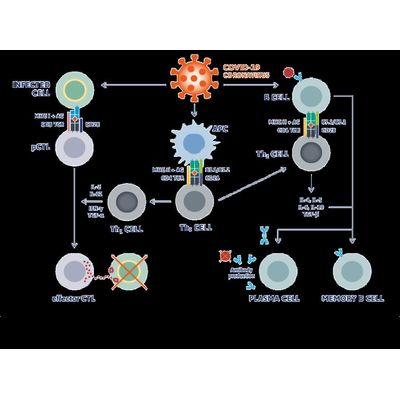

OSE Immunotherapeutics products
Agonist Antibody
OSE-230 is an agonist antibody against ChemR23, also known as chemerin chemokine-like receptor 1 (CMKLR1), a G-protein coupled receptor (GPCR) expressed on myeloid immune cells known to modulate inflammation. Persistent inflammation is a characteristic feature of all chronic inflammatory or autoimmune diseases and if not controlled or resolved, it can lead to further tissue damage and give rise to tissue fibrosis with eventual loss of organ function. Most anti-inflammatory agents act using a mechanism that blocks pro-inflammation pathways. In contrast, OSE Immunotherapeutics is developing OSE-230 as a first-in-class therapeutic agent with the potential to resolve chronic inflammation by driving affected tissues to complete the inflammation program and restore tissue integrity.
OSE - Tumor Microenvironment (TME)
In recent years, immunotherapies have driven significant clinical progress and increased hopes for patients suffering from various types of cancer. The tumor microenvironment (TME), in particular the presence and immune-status of myeloid derived suppressor cells (MDSC), tumor-associated macrophages (TAM) as well as dendritic cells, has been closely linked to tumor activity and responsiveness to T-cell-targeted immunotherapies.
CoVepiT - Multi-Target and Multi-Variant Vaccine
CoVepiT, a multi-target and multi-variant vaccine candidate against COVID-19. CoVepiT is a next-generation multi-target, multi-variant vaccine against SARS-CoV-2 in clinical Phase 1. The vaccine candidate was designed using optimized epitopes selected after screening more than 67,000 global SARS-CoV-2 genomes, as well as those of previous human-infective CoVs, SARS and MERS, to identify vaccine targets with the lowest chance of natural mutation.
Monoclonal Antibody Fragment
a monoclonal antibody fragment and CD28 antagonist, selectively blunts CD28 co-stimulation while sparing the CTLA-4 co-inhibitory signal. The net effect of CD28 antagonism is down regulating effector T-cells while promoting T-Reg activity. The CD28/CTLA-4 pathway controls both T-cell activation and regulatory T-cell down regulation. CD28 receptor is expressed on the surface of the majority of naïve T-cells and is the major co-stimulatory molecule to generate T-cell activation. In contrast, CTLA-4, a CD28 homologue, is expressed on activated T-cells, especially regulatory T-cells (T-Reg), and has been historically described as the essential component of the regulation of immune self-reactivation. Therefore, the CD28/CTLA-4 pathway is believed to be at the heart of different autoimmune diseases such as rheumatoid arthritis.
OSE - Antagonist Monoclonal Antibodies
OSE’s R&D team and its academic partners have characterized the myeloid checkpoint CLEC-1 (a C-type lectin receptor) as a new therapeutic target in immuno-oncology and identified monoclonal antibody antagonists blocking this novel “Don’t Eat Me” signal. CLEC-1 antagonist monoclonal antibodies have been identified as an innovative cancer immunotherapy that releases the brakes on macrophage phagocytosis and dendritic cells’ antigen presentation and demonstrates synergistic anti-cancer effects, in particular when paired with chemotherapy.

